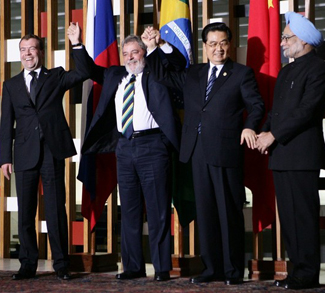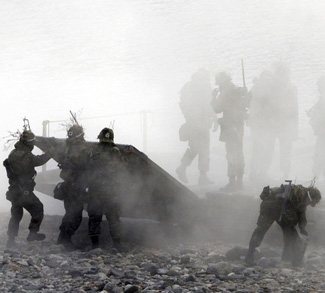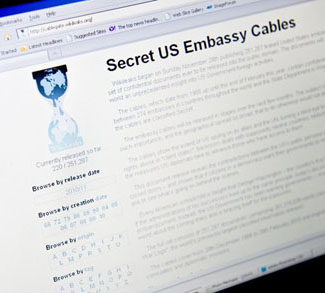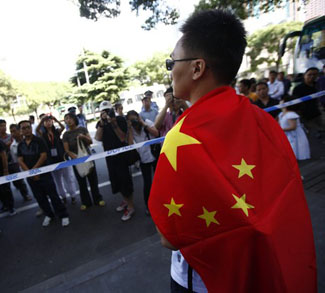FORECAST
Last week’s BRIC countries summit in Brasilia witnessed the beginning of what will surely become a trend over the next few decades: BRIC coordination against the United States on important issues in international society.
From the invention of the ‘BRIC’ acronym by Goldman Sachs up until now, BRIC countries have tended to focus on the economic realm and avoided seeking to transplant the bloc’s economic clout into the political arena. The growing influence of BRIC countries and the lack of any institutional alternative for coordination preclude that this will not be the case forever.
At Brasilia, the leaders of the BRIC countries laid the groundwork for future forays into international politics.
According to reports, the prospect of Iran sanctions figured prominently in summit discussions, though it didn’t make it into the final communiqué. During the summit, a senior Indian official was quoted as saying, “All of us agreed that we don’t think sanctions will help solve the current problems with Iran.” That the BRIC countries would come down against Iran sanctions is no surprise, for all of them have a stake in protecting the Iranian energy sector. China and India need an unencumbered Iranian energy sector for their own imports, while Russia and Brazil are motivated by other political considerations. What is surprising however is that the BRIC forum carries enough sway to dislodge India from concert with American interests; accord that has been taken for granted in post-nuclear compromise US-Indian relations. As American decline continues to erode Washington’s once-unrivaled international influence, the appeal of the BRIC forum for voicing opposition will only increase.
Though it’s easy to discount this kind of language as pompous ceremony, the BRIC countries call for a, “multipolar, equitable, and democratic world order” is also significant enough to warrant analysis. It is a manifestation of the BRIC countries’ desire to reform certain elements of the current international order. Broadly speaking, this would entail an overhaul the United Nations and the International Monetary Fund (IMF) to make them more representative of the developing world and consequently less dominated by American interests.
Interpret this statement as a warning shot for future BRIC efforts to usurp the US dollar as global reserve currency under the auspices of the IMF. Another goal is an overhaul of the United Nations Security Council, though it is one that carries a divide within the bloc, for veto-welding members of the BRIC countries are hesitant to see their power diluted.
The ‘democratic world order’ spoken of in the BRIC countries communiqué does not refer to internal democracy, but rather is lip service paid to China’s conception of international society. In Beijing’s view, international society should hold state sovereignty as sacrosanct and international institutions should simply enable state cooperation while respecting sovereignty. This view precludes any international criticism of human rights or outside support of self- determination, or ‘splittist’, movements. If, in the future, BRIC countries codify their cooperation in the form of a charter, this conception of international relations will likely be adopted as a means to delegitimize the possibility of any new ‘humanitarian interventions’ by NATO.
SUMMARY OF EVENTS: April 12th – April 19th, 2010
NORTH AMERICA
Mexico
With the prohibition-related bloodshed in Mexico continuing apace, Mexican drug trafficking organizations — the so-called cartels — are engaged not only in brutal conflict but also in shifting alliances. According to reports from Mother Jones and Al Jazeera, three rival cartels have joined forces in a battle to the death with the Zetas, the former soldiers turned Gulf cartel hit-men who eventually turned on their own employers.
United States
Falling commodity prices and mixed U.S. earnings reports sent Canadian stocks lower at the open Friday.
SOUTH AMERICA
Venezuela
President Hugo Chávez said over the weekend that China had agreed to extend $20 billion in loans to Venezuela, pointing to deepening ties between the two countries as China seeks to secure oil supplies here.
WESTERN EUROPE
Iceland
European airlines lose $200mn per day for flight cancellations due to Iceland’s volcanic activity.
Greece
Europe could lend debt-stricken Greece up to 30 billion euros (40 billion dollars) under a contingency package agreed on Sunday in a bid to restore investor confidence in the continent’s economy.
EASTERN EUROPE
Poland
Poles were in deep mourning on Sunday after President Lech Kaczynski and many of the country’s ruling elite were killed in a plane crash.
Poland on Sunday said goodbye to President Lech Kaczynski and his wife, Mary, who died last week in a plane crash near Smolensk in western Russia.
MIDDLE EAST
Iran
Iran’s President Mahmoud Ahmadinejad says the pervasive presence of US-led military forces in the Middle East is the main reason behind regional conflicts.
Israel
The new order makes it a criminal act for anyone to live in the West Bank without a permit.
Analysts for a reputable military journal have rated Israel as the world’s sixth nuclear power, alongside Britain, with up to 300 nuclear warheads.
SOUTH ASIA
Pakistan
A suicide bomber killed 10 people, including a TV journalist and senior police officials, in a suspected sectarian attack inside a hospital in Pakistan’s southwestern city of Quetta on Friday.
The assassination of ex-Pakistani PM Benazir Bhutto in 2007 could have been prevented and the subsequent inquiry was bungled, according to a UN report.
Afghanistan
Afghan prisoners are being abused in a “secret jail” at Bagram airbase, according to nine witnesses whose stories the BBC has documented.
U.S. troops fired on a crowded passenger bus on the outskirts of Kandahar city, killing four civilians and injuring 18 others, stoking anti-American protests that promised to complicate a massive offensive against Taliban insurgents this summer.
CENTRAL ASIA
Kyrgyzstan
The interim leader of Kyrgyzstan has said ousted President Kurmanbek Bakiyev should stand trial over the recent deadly political unrest.
Russia will give Kyrgyzstan a $20 mln grant and a $30 mln concessional loan to help stabilize the economic situation in the ex-Soviet republic after recent riots, Finance Minister Alexei Kudrin said on Wednesday.
Shots were fired at a rally in southern Kyrgyzstan, where the ousted president Kurmanbek Bakiyev was addressing a crowd.
Kurmanbek Bakiyev, the deposed president of Kyrgyzstan, has formally resigned from his post, the country’s new leaders say.
The political turmoil in Kyrgyzstan was caused by a lack of solid democratic institutions, a chief Kremlin ideologist told RIA Novosti on Friday.
EAST ASIA
China
Economists call them the Bric countries. Hiding behind the obscure title are some of the world’s fastest growing and potentially largest economies – Brazil, Russia, India and China. Now the leaders of these countries are meeting in Brazil’s capital Brasilia for the second Bric summit.
Military exchanges between China and the United States are still suspended, a People’s Liberation Army spokesman said Tuesday, despite a recent warming of relations between the countries.
Some 400 people have died and thousands are feared injured after a magnitude-6.9 quake hit western China’s Qinghai province, officials say.
North Korea
North Korea has denied involvement in the sinking of a South Korean navy ship that broke in half after an explosion last month, leaving 44 sailors still missing, a newspaper reported on Saturday.
Burma
Three explosions in Burma’s former capital city, Rangoon, have killed at least nine people, reports say.
AFRICA
Somalia
Barack Obama, the US president, has issued an executive order to freeze assets of individuals with ties to Somalia’s al-Qaeda-linked al-Shabab movement.
OCEANA
Australia
Australian officials have arrested the captain and chief officer of a Chinese coal ship which ran aground on the Great Barrier Reef.




